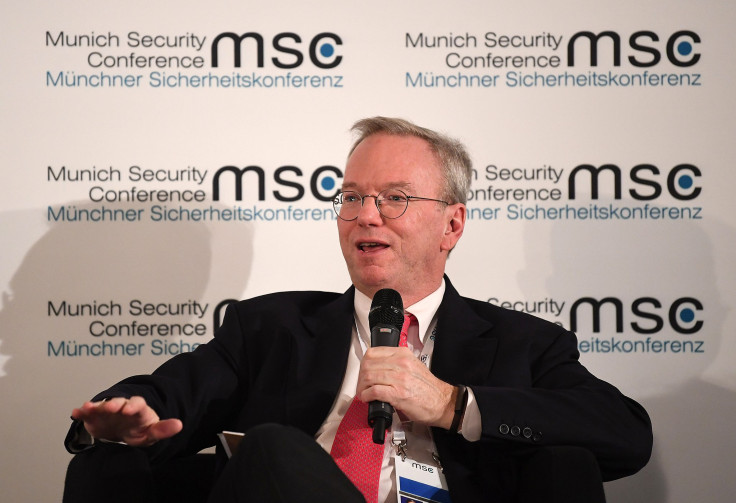AI in the Wrong Hands? Ex-Google CEO Eric Schmidt Fears Tech Could Be Used for Biological Weapons
Schmidt also supports smartphone restrictions for kids

Former Google CEO Eric Schmidt has warned that artificial intelligence (AI) could be misused in a "Bin Laden scenario" or by "rogue states" to cause harm to innocent people.
"The real fears I have are not the ones most people discuss when it comes to AI – I focus on extreme risk," Schmidt told the BBC. Speaking on the Today programme, the tech billionaire, who led Google from 2001 to 2017, cautioned that countries such as North Korea, Iran, or even Russia could obtain and abuse the technology to develop biological weapons.
Schmidt's Stark Warning
He urged government supervision of private tech firms developing AI models while cautioning against excessive rules that could hinder progress. Additionally, Eric Schmidt supported US export restrictions on powerful microchips that drive cutting-edge AI systems.
Before leaving office, former US President Joe Biden restricted American companies from providing their microchips to all except 18 countries to hinder adversaries' AI advancements. However, Donald Trump could still reverse this decision.
'Think about North Korea, or Iran, or even Russia, who have some evil goal,' Schmidt said. 'This technology is fast enough for them to adopt that they could misuse it and do real harm,' he told Today presenter Amol Rajan.
He added that AI systems if misused, could be employed to create weapons for a devastating biological attack orchestrated by a malicious individual. 'I'm always worried about the 'Osama Bin Laden' scenario, where you have some truly evil person who takes over some aspect of our modern life and uses it to harm innocent people,' he said.
Balancing Innovation And Oversight
Bin Laden masterminded the 9/11 attacks in 2001, where aeroplanes were used to kill thousands on American soil. Schmidt suggested a middle ground between government supervision of AI progress and excessive rules for the industry. 'The truth is that AI and the future is largely going to be built by private companies,' he added.
'It's really important that governments understand what we're doing and keep their eye on us. We're not arguing that we should unilaterally be able to do these things without oversight; we think it should be regulated,' Schmidt said.
He spoke from Paris following the AI Action Summit, where the US and UK declined to sign the agreement. US Vice President JD Vance stated that regulation would 'kill a transformative industry just as it's taking off.'
Schmidt stated that excessive regulation in Europe would mean 'the AI revolution, which is the most important revolution in my opinion since electricity, is not going to be invented in Europe.' He also noted that major tech companies 'did not understand 15 years ago' the potential of AI, but they do now.
'My experience with the tech leaders is that they do have an understanding of the impact they're having, but they might make a different values judgment than the government would make,' the 69-year-old businessman said.
Smartphone Restrictions For Kids
Schmidt led Google when it acquired Android, the company behind the world's most popular mobile operating system. He now backs efforts to keep phones out of schools. 'I'm one of the people who did not understand, and I'll take responsibility that the world does not work perfectly the way us tech people think it is,' he said.
'The situation with children is particularly disturbing to me. I think smartphones with a kid can be safe," he said, "they just need to be moderated... we can all agree that children should be protected from the bad of the online world,' he continued.
On social media, where he endorsed suggestions for a ban on children under 16—Schmidt wrote, 'Why would we run such a large, uncontrolled experiment on the most important people in the world, which is the next generation?'
Advocates for restricting children's smartphones argue that phones are addictive and 'have lured children away from the activities that are indispensable to healthy development.' Last year, Australia's parliament passed a law banning social media for under-16s. Prime Minister Anthony Albanese attributed the move to their attempt to protect children from its 'harms.'
A recent study in The Lancet indicated that school mobile phone bans didn't improve student conduct or grades. However, it did find a correlation between increased time spent on smartphones and social media in general and poorer performance in all those areas.
© Copyright IBTimes 2025. All rights reserved.






















